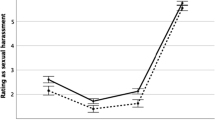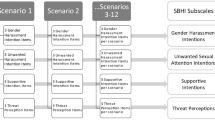Abstract
This study analyzes a factorial survey, incorporating vignettes about student-to-student sexual harassment, completed by undergraduates at a small liberal arts college. As in previous studies, perceived seriousness levels for such incidents are shown to depend primarily on the perpetrator's behavior. However, perceived seriousness also depends strongly on the accounts offered by the perpetrator for his behavior and to a lesser extent on verbal reactions of the female victim. Furthermore, some types of accounts reduce the perceived seriousness of the behavior, while others increase it. Male and female respondents differ in their overall means, but do not differ significantly in the factors that influence perceived seriousness. Some implications of these results for the study of sexual harassment and of accounts are noted.
Similar content being viewed by others
References
Abbey, A. (1987). Misperceptions of friendly behavior as sexual interest: A survey of naturally occurring incidents. Psychology of Women Quarterly, 11, 173–194.
Austin, J. L. (1961). A plea for excuses. In J. O. Urmson & G. J. Warnock (Eds.), J. L. Austin: Philosophical papers [1970]. London: Oxford University Press.
Benson, D., & Thompson, G. (1982). Sexual harassment on a university campus: The confluence of authority relations, sexual interest, and gender stratification. Social Problems, 29, 236–251.
Berger, R. J., & Searles, P. (1985). Victim-offender interaction in rape: Victimological, situational, and feminist perspectives. Women's Studies Quarterly, 13, 9–15.
Blumstein, P. W., with Carssow, K., Hall, J., Hawkins, B., Hoffman, R., Ishem, E., Maurer, C., Spens, D., Taylor, J., & Zimmerman, D. (1974). The honoring of accounts. American Sociological Review, 39, 551–566.
Burt, M. R. (1980). Cultural myths and supports for rape. Journal of Personality and Social Psychology, 38, 217–230.
Burt, M. R. (1983). Justifying personal violence: A comparison of rapists and the general public. Victimology, 8, 131–150.
Felson, R. B., & Ribner, S. (1981). An attributional approach to accounts and sanctions for criminal violence. Social Psychology Quarterly, 44, 137–142.
Hall, E., Howard, J., & Boezio, S. (1986). Tolerance of rape: A sexist or antisocial attitude? Psychology of Women Quarterly, 10, 101–118.
Hewitt, J., & Stokes, R. (1975). Disclaimers. American Sociological Review, 40, 1–11.
Hunter, C. (1984). Aligning actions: Types and social distribution. Symbolic Interaction, 7, 155–174.
Hupka, R., Jung, J., & Silverthorn, K. (1987). Perceived acceptability of apologies, excuses, and justifications in jealousy predicaments. Journal of Social Behavior and Personality, 2, 303–313.
Kitayama, S., & Burnstein, B. (1988). Automatically in conversations: A reexamination of the mindlessness hypothesis. Journal of Personality and Social Psychology, 54, 219–224.
Koss, M. P., Gidycz, C. A., & Wisnieski, N. (1987). The scope of rape: incidence and prevalence of sexual aggression and victimization in a national sample of higher education students. Journal of Consulting and Clinical Psychology, 55, 162–170.
Langer, E. J. (1978). Rethinking the role of thought in social interaction. In J. Harvey, W. Ickes, & R. Kidd (Eds.), New directions in attribution research (Vol. 2). Hillsdale, NJ: Erlbaum.
Lottes, I. (1988). Sexual socialization and attitudes toward rape. In A. Burgess (Ed.), Rape and sexual assault II. New York: Garland.
Margolin, L., Miller, M., & Moran, B. (1989). When a kiss is not just a kiss: Relating violations of consent in kissing to rape myth acceptance. Sex Roles, 20, 231–243.
Marolla, J., & Scully, D. (1986). Attitudes toward women, violence, and rape: a comparison of convicted rapists and other felons. Deviant Behavior, 7, 337–355.
Mazer, D. B., & Percival, E. F. (1989a). Students' experiences of sexual harassment at a small university. Sex Roles, 20, 1–22.
Mazer, D. B., & Percival, E. F. (1989b). Ideology or experience? The relationship among perceptions, attitudes, and experiences of sexual harassment in university students. Sex Roles, 20, 135–147.
McClelland, K., & Hunter, C. (1989). Sexual harassment and sexist beliefs on a small college campus. Unpublished manuscript.
McLaughlin, M., Cody, M., & O'Hair, D. (1983). The management of failure events: some contextual determinants of accounting behavior. Human Communication Research, 9, 208–224.
Mills, C. W. (1940). Situated actions and vocabularies of motives. American Sociological Review, 5, 904–913.
Murnen, S., Perot, A., & Byrne, D. (1989). Coping with unwanted sexual activity: Normative responses, situational determinants, and individual differences. The Journal of Sex Research, 26, 85–100.
Neff, J. A. (1979). Interactional versus hypothetical others: The use of vignettes in attitude research. Sociology and Social Research, 64, 105–125.
Ohbuchi, K., Kameda, M., & Agarie, N. (1989). Apology as aggression control: Its role in mediating appraisal of and response to harm. Journal of Personality and Social Psychology, 56, 219–227.
Orcutt, J. B., & Faison, R. (1988). Sex-role attitude change and reporting of rape victimization, 1973–1985. The Sociological Quarterly, 29, 589–604.
Pryor, J. B. (1985). The lay person's understanding of sexual harassment. Sex Roles, 13, 273–286.
Reilly, M. E., Lott, B., & Gallogly, S. (1986). Sexual harassment of university students. Sex Roles, 15, 333–358.
Reilly, T., Carpenter, S., Dull, V., & Barlett, K. (1982). The factorial survey: An approach to defining sexual harassment on campus. Journal of Social Issues, 38, 99–110.
Riordan, C., Marlin, N., & Gidwani, C. (1988). Accounts offered for unethical research practices: Effects on the evaluations of acts and actors. Journal of Social Psychology, 128, 495–505.
Riordan, C., Marlin, N., Kellogg, R. (1983). The effectiveness of accounts following transgression. Social Psychology Quarterly, 46, 213–219.
Rossi, P. H., & Anderson, A. B. (1982). The factorial survey approach: An introduction. In P. H. Rossi & S. L. Nock (Eds.), Measuring social judgments: The factorial survey approach. Beverly Hills, CA: Sage.
Schlenker, B., & Darby, B. (1981). The use of apologies in social predicaments. Social Psychology Quarterly, 44, 271–278.
Schonbach, P. (1980). A category system for accounts phrases. European Journal of Social Psychology, 10, 195–200.
Scott, M., Lyman, S. (1968). Accounts. American Sociological Review, 33, 46–62.
Scully, D., & Marolla, J. (1984). Convicted rapists' vocabulary of motive: Excuses and justifications. Social Problems, 31, 530–544.
Sears, D. O. (1986). College sophomores in the laboratory: Influences of a narrow data base on social psychology's view of human nature. Journal of Personality and Social Psychology, 51, 515–530.
Semin, G. R., & Manstead, A. S. R. (1983). The accountability of conduct: A social psychological analysis. European Monographs in Social Psychology, 33, Orlando, FL: Academic Press.
Shields, N. M. (1979). Accounts and other interpersonal strategies in a credibility detracting context. Pacific Sociological Review, 22, 255–272.
Shotland, R. L., & Goodstein, L. (1983). Just because she doesn't want to doesn't mean it's rape: An experimentally based causal model of the perception of rape in dating situation. Social Psychology Quarterly, 46, 220–232.
Snyder, C. R., & Harris, R. N. (1987). The role of similarity/difference information in excuse-making. In C. R. Snyder & C. E. Ford (Eds.), Coping with negative life events: Clinical and social psychological perspectives. New York: Plenum.
Snyder, C. R., Higgins, R. L. (1988). Excuses: Their effective role in the negotiation of reality. Psychological Bulletin, 104, 23–35.
Snyder, C. R., Higgins, R. L., Stucky, R. J. (1983). Excuses: Masquerades in search of grace. Wiley Series on Personality Processes. New York: Wiley.
Stets, J. E., & Pirog-Good, M. A. (1987). Violence in dating relationships. Social Psychology Quarterly, 50, 237–246.
Stokes, R., & Hewitt, J. (1976). Aligning actions. American Sociological Review, 41, 838–849.
Tedeschi, J., & Reiss, M. (1981). Verbal strategies in impression management. In C. Antaki (Ed.), The Psychology of ordinary explanations of social behavior, European Monographs in Social Psychology 23. London: Academic Press.
Ungar, S. (1981). The effects of status and excuse on interpersonal reactions to deviant behavior. Social Psychology Review, 44, 260–263.
Weber-Burdin, E., & Rossi, P. H. (1982). Defining sexual harassment on campus: A replication and extension. Journal of Social Issues, 38, 111–120.
Weiner, B., Amirkan, J., Folkes, V., & Verette, J. (1987). An attributional analysis of excuse giving: Studies of a naive theory of emotion. Journal of Personality and Social Psychology, 52, 316–324.
Author information
Authors and Affiliations
Additional information
We are grateful for the assistance of Kari Edwards, Kristin Hoffschmidt, James Howard, Susan Prout, Rita Rawson, Andrew Rutledge, John Williams, and Rebecca Wilson, who helped directly in this research effort; Sharon Hutchins, Kathryn Thurber, Anthony Weeks, and Paul Commins who offered useful advice; and Karen Groves, Faun Black, and Roger Lasley, who provided technical assistance. We would particularly like to thank two anonymous reviewers for their insightful comments. Any errors that remain are entirely our own.
Rights and permissions
About this article
Cite this article
Hunter, C., McClelland, K. Honoring accounts for sexual harassment: A factorial survey analysis. Sex Roles 24, 725–752 (1991). https://doi.org/10.1007/BF00288209
Issue Date:
DOI: https://doi.org/10.1007/BF00288209




